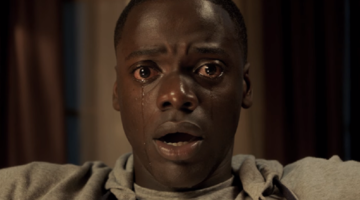Review: Dawn of the Planet of the Apes
Within the film, it’s the rapid evolution of primates. On screen, it’s the apex of visual effects. In the crowd, it’s a re-sensitization of violence and death.
So goes Dawn of the Planet of the Apes, the sequel set ten years after the reboot and prequel (Rise of…) that now finds advanced primates living in a bucolic forest colony while millions of humans have died from a simian flu.
The ape world is massive, coordinated, and peaceful. They’ve calculated hunting attacks, crafted weapons, tamed horses, learnt to sign, and some can even talk. Led by Caesar, the innocent chimp turned revolutionary leader of the first film (raised by James Franco’s scientist, not present here), the apes have not seen or heard from humans in years, assuming them dead or dying.
Until now of course. Two primate scouts stumble upon a group of armed humans seeking hydroelectric power for their respective colony, and indeed salvation. The encounter sets forth a Cold War of Shakespearean proportions between and among the two species. While Caesar and his equally thoughtful, idealistic human counterpart Malcolm (Jason Clarke) seek careful peace through hesitant trust, they’ve each a co-leader of sorts in former lab tested Koba and Dreyfus (Gary Oldman) that are more militaristic and less patient.
Misunderstandings, deceits, acts of courage, and pleas of peace unfold in a first half of a movie that is beautiful and haunting. With sure steps and methodical storytelling, tension creeps in and never dissipates. It’s the far more interesting and indeed less tragic half as the Cold War eventually, inevitably erupts into a firefight when a villainous scheme is set afoot.
With breathtaking visuals and incredible attention to detail (the apes are simply magnificent in each and every shot), the primates, are the ones with whom we align. When they die – and some do – it’s heartbreaking. When guns appear on screen, whether wielded by humans or later the apes themselves, they are the most violent and uncomfortable images of such omnipresent, blasé instruments of death that have been seen in recent memory.
The apes become more like the humans, in all the wrong ways. Untrusting, fearful, duplicitous, their once close-knit clan becomes fractured, and it in fact all hell breaks loose. Were the second half of the movie not riding on already heightened tension, it may lead to yet another baggy ending that is the pillar of summer blockbusters. Instead, it’s still taut drama and uncomfortable violence that is made novel maybe only because it involves animals – animals with whom we are invested.
It’s not just Caesar, as attention and care is given to well, humanize, other members of this increasingly familiar society. Caesar has a son, Blue Eyes, who fights by his side but he is at times reckless and still naïve. Koba is the violent, less trusting, and completely nefarious-looking primate who is second in command. There is Maurice, the mentoring Orang, and still others that are identifiable. Or at least, they are given names, and that there makes us care.
The humans are less inviting, but aided by the expressive, warm nature that the talented actors – Clarke, Keri Russell Gary Oldman– bring with them already. While the former two have learned to love again and become a team in this apocalyptic world, the latter champions practicality while acting on desperation. Whatever (whoever) stands in the way of getting power back to a dying colony must be destroyed.
It’s only a matter of time before the powder keg is lit. When it does it’s a fueled by fright and spectacular imagery that has been smartly set up; we spend plenty of time with the apes to completely buy in to their wide array of skills and abilities.
Only a tiny bit of humour is sprinkled in this stressful, mostly joyless epic spectacle that is as emotionally aggravating as it is visually stunning. That it takes apes to utilize firearms and in turn die for audiences to become sympathetic is certainly a sign of the times – whether or not it’s progress or regress is another matter. Still, as the title suggests, the apes will move onward, they will just have more problems with which to contend.
[star v=4]




